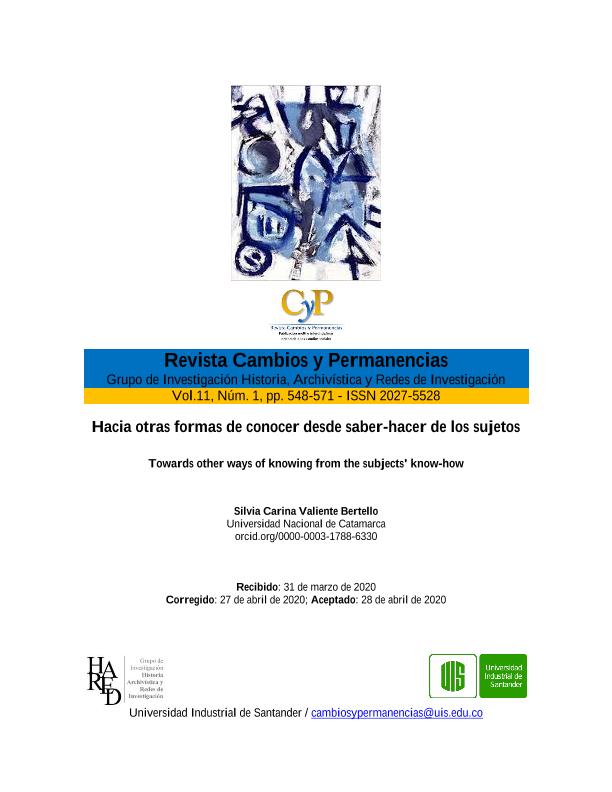Mostrar el registro sencillo del ítem
dc.contributor.author
Valiente, Silvia Carina

dc.date.available
2022-09-19T14:33:59Z
dc.date.issued
2020-06
dc.identifier.citation
Valiente, Silvia Carina; Hacia otras formas de conocer desde saber-hacer de los sujetos; Universidad Industrial de Santander; Cambios y Permanencias; 11; 1; 6-2020; 548-571
dc.identifier.uri
http://hdl.handle.net/11336/169286
dc.description.abstract
La presente contribución tiene como objetivo reflexionar sobre un proceso de investigación en marcha que se apoya en una manera de hacer pensante centrado en el sujeto. En esta forma de construcción del conocimiento defendida por quienes pregonan por una investigación desde abajo y desde el sur, debe prevalecer el pensar epistémico sobre el teórico como base para pensar, categorizar y recategorizar, con miras a dejar de reproducir el conocimiento y crearlo desde la experiencia de los sujetos. En esta línea de pensamiento se desarrollaron diversas perspectivas/maneras de investigar en la región. En este caso, optamos por asumir el desafío de hacer un modo de investigación centrado en el sujeto siguiendo la provocación de autores mexicanos que referencian sus reflexiones en el sujeto anticapitalista y antiestatista inspirado en el sujeto zapatista que tiene la autonomía como proyecto y el caminar preguntando como método (Sandoval y Alonso, 2015; Salcido y Sandoval, 2016; Sandoval, 2016, 2018 y 2019). Nosotros como equipo, desde nuestro aquí y ahora, reflexionaremos en este escrito sobre las posibilidades y limitaciones de este modo de hacer-pensante.
dc.description.abstract
The objective of this contribution is to reflect on an ongoing research process that is based on a way of thinking that is centered on the subject. In this form of construction of knowledge defended by those who proclaim an investigation from below and from the south, epistemic thinking must prevail over the theoretical as a basis for thinking, categorizing and recategorizing, with a view to stop reproducing knowledge and creating it from the experience of the subjects. In this line of thought various perspectives / ways of research in the region were developed. In this case, we choose to take on the challenge of doing a subject-centered mode of research following the provocation of Mexican authors who refer their reflections to the anti-capitalist and anti-statist subject inspired by the Zapatista subject who has autonomy as a project and walks asking as a method (Sandoval and Alonso, 2015, Salcido and Sandoval, 2016; Sandoval 2016, 2018 and 2019). We as a team, from our here and now, will reflect in this writing on the possibilities and limitations of this way of thinking.
dc.format
application/pdf
dc.language.iso
spa
dc.publisher
Universidad Industrial de Santander
dc.rights
info:eu-repo/semantics/openAccess
dc.rights.uri
https://creativecommons.org/licenses/by/2.5/ar/
dc.subject
SUJETO
dc.subject
PRODUCCIÓN DE CONOCIMIENTO
dc.subject
PENSAR EPISTÉMICO
dc.subject.classification
Otras Humanidades

dc.subject.classification
Otras Humanidades

dc.subject.classification
HUMANIDADES

dc.title
Hacia otras formas de conocer desde saber-hacer de los sujetos
dc.title
Towards other ways of knowing from the subjects' know-how
dc.type
info:eu-repo/semantics/article
dc.type
info:ar-repo/semantics/artículo
dc.type
info:eu-repo/semantics/publishedVersion
dc.date.updated
2022-09-16T20:50:37Z
dc.identifier.eissn
2027-5528
dc.journal.volume
11
dc.journal.number
1
dc.journal.pagination
548-571
dc.journal.pais
Colombia

dc.journal.ciudad
Santander
dc.description.fil
Fil: Valiente, Silvia Carina. Consejo Nacional de Investigaciones Científicas y Técnicas. Centro de Investigaciones y Transferencia de Catamarca. Universidad Nacional de Catamarca. Centro de Investigaciones y Transferencia de Catamarca; Argentina
dc.journal.title
Cambios y Permanencias
dc.relation.alternativeid
info:eu-repo/semantics/altIdentifier/url/https://revistas.uis.edu.co/index.php/revistacyp/article/view/11073
Archivos asociados
